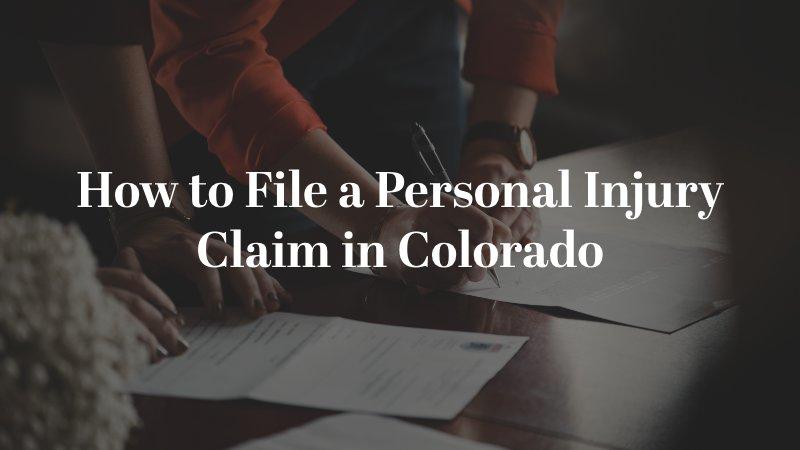If someone else’s reckless or negligent actions injured you or your loved one, you may be eligible to recover for your accident-related injuries and other losses. Colorado allows victims of personal injury accidents to file claims for compensation against people, corporations, and governmental entities who cause them harm.
The following generally outlines the personal injury claims process in Colorado and how to file a personal injury claim. For specific case information and a case review, contact a personal injury attorney in your area.

Consult with a Personal Injury Attorney Before Starting the Claims Process
Before starting the personal injury claims process in Colorado, it is wise to consult with an experienced attorney. Anything you say to the insurance adjuster regarding your personal injury accident can be used against you in the claims process.
A personal injury attorney can advise you on common insurance company tactics used to deny and lowball claims. They can also tell you how insurance adjusters will attempt to use your statements to shift blame for the accident to you when possible.
When you work with a personal injury attorney, they handle all insurance company correspondence and calls. This will eliminate any chances of a misstatement on your behalf.
Your personal injury attorney will manage your case from start to finish, whether your case ends in a settlement or a trial. They will also know a fair damages amount for your case and when to settle.
Most personal injury attorneys offer a complimentary consultation and claim review. With no risk to you, it is in your best interests to reach out and schedule your appointment with a professional today.
How to File a Personal Injury Claim in Colorado
Most personal injury claims are settled without going to court. The personal injury claims process starts by sending a detailed demand letter to the parties responsible for the accident and their insurers.
Demand letters include information about the accident, such as:
- What occurred;
- How the other party is responsible; and
- What kinds of compensation are sought by the victim, and at what amounts.
After reviewing the demand letter, the insurance adjuster may deny the claim, make a counteroffer, or settle the claim. Provable claims presented by attorneys are usually answered with counter-offers to settle at a lesser amount.
Settlement Discussions in a Personal Injury Claim in Colorado
Settlement discussions will continue in a personal injury claim until a fair settlement amount is reached. This can take several rounds of negotiations.
Upon settlement, the insurance company will require the victim to sign documents releasing them from liability for further damages. Then, a check will be issued to pay off any medical liens, case expenses, and pay the victim.
Filing a Personal Injury Lawsuit in Colorado
When negotiations fail, a personal injury victim and their attorney may choose to take their case before the court. Court proceedings can be lengthy and risky.
A formal trial conducted by a judge before a jury can be costly for both sides of a personal injury case. It can also be rewarding.
There are opportunities to settle a case while preparing for trial. This often occurs as each side learns more about the strengths and weaknesses of their cases.
Contact an Experienced Denver Personal Injury Attorney Today
There are deadlines to file a personal injury claim in Denver. Do not risk missing yours.
Speak with an experienced Denver personal injury attorney at Dulin McQuinn Young today. We have over 20 years of trial experience and are driven to produce results for our clients.
Dulin McQuinn Young has a proven track record of success and is ready to meet with you to review your personal injury claim. Call our Denver office now to learn more about our firm and the benefits of choosing Dulin McQuinn Young as your personal injury law firm.